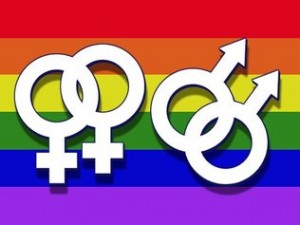Alvin McEwen blogged on Monday about NOM pushing a new Regnerus “study.” McEwen rightfully points out how dishonest it is for NOM to continue pushing Regnerus’s work despite the fact that he and his work have been heavily discredited over the past several months.
What I find interesting is how NOM presents and interprets this new “study”:
Activists trying to force a redefinition of marriage on America have constantly evaded the question, “what is marriage?” Meanwhile, they have insisted that gays and lesbians simply want access to the same sacred institution of marriage and that they don’t intend to change anything about that institution.
But the survey responses from gay men and lesbians themselves don’t support these claims.
The institution envisioned by those who want to redefine marriage isn’t faithful… it isn’t exclusive… it isn’t permanent… put bluntly, it isn’t marriage.
So basically, Regnerus polls a bunch of people about a number of views and NOM tries to interpret the answers to those views as people’s understanding of what marriage is. That’s problematic at best.
So let’s take a look at some of those views from the poll.
Viewing pornography is OK. This one has absolutely nothing to do with marriage. Some people look at porn. Others don’t. Some married people watch porn. (Some even watch it with their married partner!) Some don’t. Some single people watch porn. Some single people don’t. Saying that viewing pornography is acceptable doesn’t really reveal much — if anything — about one’s views of marriage.
I’d also like to note that saying that viewing pornography is okay is not that same as saying that viewing pornography is never problematic. Yes, if viewing pornography is interfering with one’s relationship(s) (by say, changing your attitudes toward the people in your life, especially your romantic partner), that’s a huge problem. However, that does not mean that viewing pornography in general is a horrible thing. NOM is effectively trying to use this one statement to cast everything in a black and white argument where there is much more nuance to be considered.
Premarital cohabitation is good. Again, this statement really doesn’t tell you anything about a person’s views on marriage. A person may think that living together before marriage is good and important and yet still consider their wedding vows of great importance when the take them. In fact, some people promote living together before marriage because they take their wedding vows seriously and want to have a sense of how living together will work out before making the final commitment.
No-strings-attached sex is OK. It seems to me that this one goes off the rails in various ways. Most notably, I think it demonstrates that NOM is projecting it’s own belief that every person (excepting possibly clergy) should get married onto everyone else. I don’t believe that every should get married. What I believe is that LGBT people who want to get married should be allowed to do so. If LGBT people who prefer not to get married would rather engage in no-strings sex with each other, I say more power to them. It doesn’t change how I feel about marriage. NOM fails to understand that the facts that I think I should be allowed to get married and that other people should be allowed to pursue other relationship and sexual choices for themselves are not contradictory.
Also, I’ll note that it’s possible to enjoy no-strings sex while single and still look forward to a more committed relationship in the future. NOM doesn’t seem to understand that, either. (Not surprising, as I suspect there’s a lot of ideological overlap between NOM and purity culture, which tends to at least imply that any sex outside of marriage “ruins” you for marriage.)
Couples with kids should stay married except for abuse. You know what? I don’t believe in auditing other people’s lives. I think that individual families need to consider their own circumstances and work out what the best choices for themselves are. I do not feel qualified nor do I feel I have or deserve the authority to tell them under what circumstances they are allowed to make which choices. If NOM thinks that this means that I don’t take marriage seriously, then NOM doesn’t know me at all. I know what my goals are for marriage. I just realize that (1) those goals may not work for everyone and (2) they ultimately may not work out for me either. I’m simply open to that possibility.
Marital infidelity is sometimes OK. Okay, this is a position that I tend not to hold. I tend to believe that if you’ve made a commitment to be in a monogamous relationship with someone, you should keep that commitment. If you find you can’t keep that commitment, then you should either seek to renegotiate the relationship or honestly seek to end it. Yes, I do consider ending a relationship acceptable. So I will acknowledge that while I see marriage as ideally permanent, I accept the reality that it doesn’t always work out that way in practical terms. But I don’t see the benefit in denying reality, so I don’t see this as some huge admittance of defeat on my part.
It is OK for 3+ adults to live in a sexual relationship. I’m totally on board with this one, and unapologetically so. So no, I don’t see marriage as necessarily exclusive. I think that’s for the people involved to determine for their own relationship(s).
I just don’t see that as a horrible thing. Truth be told, I find the idea that Christians — especially Christians who scream about “taking the Bible literally” — being anti-polyamory rather odd, anyway. The Old Testament is full of men — men deemed Godly by the text and tradition — taking multiple wives (and concubines, no less). And there are only two explicit prohibitions against polygamy in the Bible, both of which limit the prohibition to specific groups of people. (That’d be the kings of Israel in t Old Testament and pastors/bishops in the New Testament.)
But setting all that aside, does the fact that I’m unwilling to condemn or criticize people who choose a polyamorous relationship really destroy my own right to enter into a legally recognized monogamous marriage?
Ultimately, it seems to me that NOM’s argument is that they only want to let people into their marriage club if those people are willing to go on policing the choices of others. I’m not okay with that.






